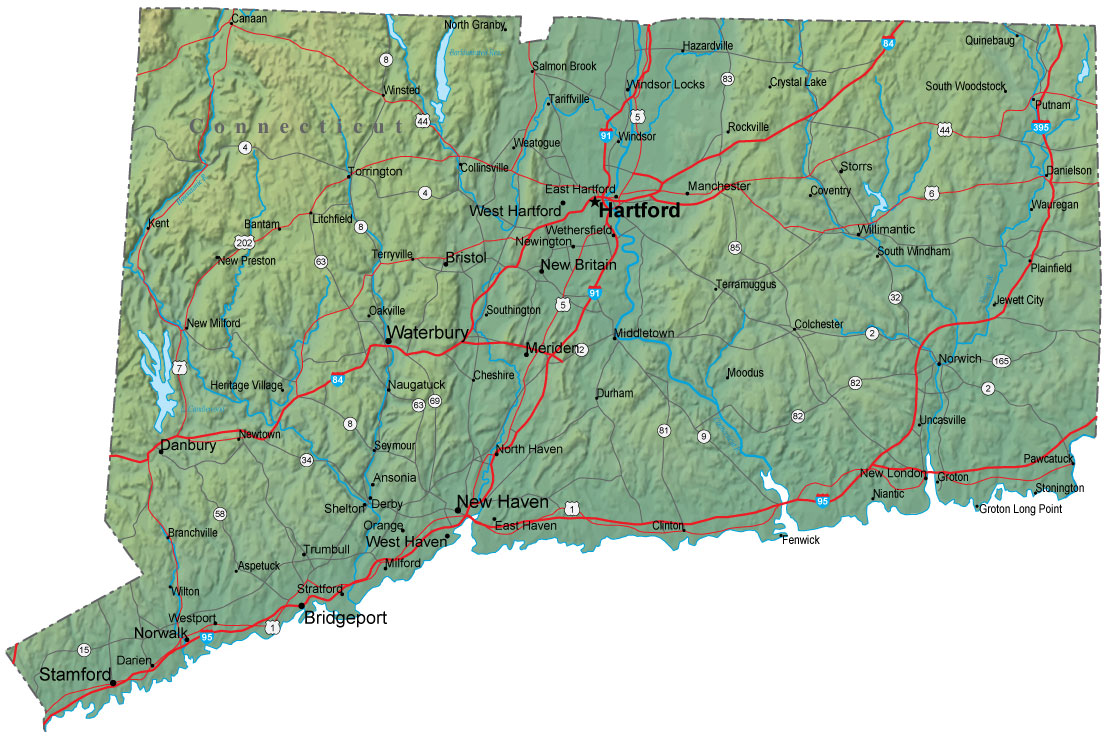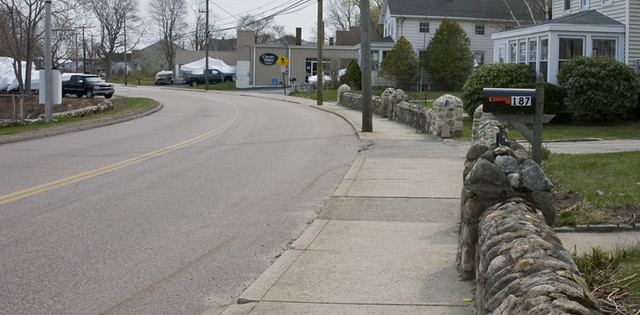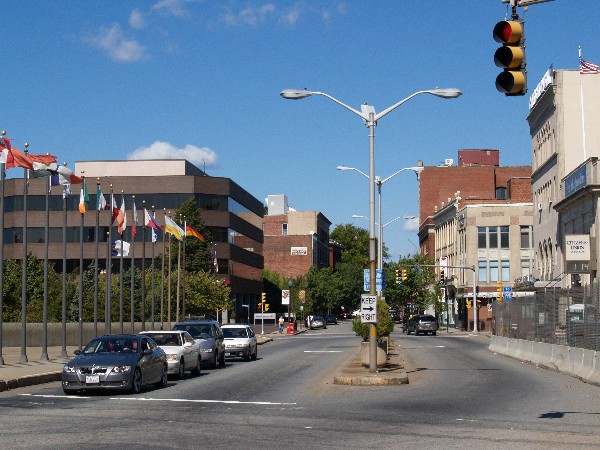Blue Highways: Pawcatuck, Connecticut
Unfolding the Map
 We cross into Connecticut... the 31st state on the Blue Highways tour. I have some connection to Connecticut - I used to go there quite a bit to see some friends but I haven't been there in several years now. I used to go to New York City a lot, and that would bring me to Connecticut. This post i about how I was intimidated to drive in New York City, until I actually did it. To see where Pawcatuck sits, follow the freeway to the map.
We cross into Connecticut... the 31st state on the Blue Highways tour. I have some connection to Connecticut - I used to go there quite a bit to see some friends but I haven't been there in several years now. I used to go to New York City a lot, and that would bring me to Connecticut. This post i about how I was intimidated to drive in New York City, until I actually did it. To see where Pawcatuck sits, follow the freeway to the map.
Book Quote
"When I crossed the Pawcatuck River into Pawcatuck, Connecticut, just up the old Post Road from Wequetequock, I realized I was heading straight into New York City. I had two choices: drive far inland to bypass it or take the New London-Orient Point ferry to Long Island and cut through the bottom edge of the Apple."
Blue Highways: Part 9, Chapter 6
 Mechanic Street in Pawcatuck, Connecticut. Photo by Jennifer and Pat at their Road Trip Memories blog. Click on photo to go to host page.Pawcatuck, Connecticut
Mechanic Street in Pawcatuck, Connecticut. Photo by Jennifer and Pat at their Road Trip Memories blog. Click on photo to go to host page.Pawcatuck, Connecticut
It's hard for me to believe, but there was a time when I'd have avoided New York City.
Don't get me wrong. I understand LHM's reasons for trying to find a way that minimized his exposure to NYC. After all, Blue Highways states very clearly at the beginning that LHM's purposes is to find the roads less traveled. He is not, in any sense of the word, a socially anxious person.
He is unlike my parents, for example, who avoided cities if they could help it. We lived in a rural town with a population of just over 5,000 people. The biggest city that my parents cared to visit regularly was a town of about 50,000 two hours drive distant, and they only did that for medical reasons or perhaps to do some shopping. Since the mall was just off the freeway, or in other words easy to get into and easy to get out of, that suited them just fine. When we did have to go farther, to San Francisco or Oakland for example, that was occasion for anxiety. I've already written about how horrible it was for them to take a wrong turn or get off on the wrong exit.
I was a little different. Something in me sought out the challenges of cities. When I left California at age 22, I went to live in Milwaukee. Milwaukee was large, about 500,000 people, and it felt like a big city. Driving in Milwaukee, especially on the freeways, was fun because you had to be aware at all times. Milwaukee was one of those cities that was built first, and when freeways came around they just threw them into places where they might best fit. Curves were sharp and one had to watch for exits as they would just sneak up on you and before you knew it, you'd have passed them. There was even a "bridge to nowhere," that was part of a lakefront freeway that never quite happened. The freeway crossed the bridge over the harbor area and then, abruptly, ended in the quaint neighborhood of Bay View.
Chicago was Milwaukee times ten. Miles and miles of freeways seemingly plunked down in the middle and the outskirts of the city. As I drove through, looking up at the tall buildings, they seemed to almost mock me in my puny car, as if I and the rest of the little ants driving in didn't belong there. Chicago was always filled with pitfalls. Exits that one had to watch for on both sides, construction continually happening that blocked exits and made one detour. Traffic jams that slowed things to a crawl and made a usual half-hour trip past downtown turn into two hours or more. Aggressive drivers that scared the hell out of the rookie Chicago driver. Toll booths where you literally tossed coins into a basket and hoped that the little green light flashed on. Yet I never avoided downtown Chicago. I could have taken the I-294 loop around the city, but I loved the challenge and I loved the views and therefore I always aimed my vehicle for the heart of downtown.
I never avoided the downtowns of any other city either. Even if it meant taking less time off my trip, I drove through downtown Philadelphia, Cincinnati and Indianapolis just to see them. But New York City was a different animal. I was intimidated by that city. I had never been there, but just the reputation alone, built up by reputation passed on through books, television, movies and word-of-mouth and other sources had me convinced that one needed to be an expert to drive there. So it was with great trepidation that I took my first driving trip from Milwaukee to New York. It seemed simple enough. I would cross the George Washington Bridge, take the first exit and find a friend's place on the upper West Side just a stone's throw from the bridge. It was intimidating, but I did it. When I parked the car, I felt like the member of an exclusive club. Nobody I had grown up with had ever driven in New York City!
Of course, that's all I did. And even parking the car was a problem. The next morning when I got up I was warned that I should check on my car because it was garbage day. I ran out to find the street empty save for my car, which was adorned with a large ticket and a big red sticker on the the window that declared how my car had impeded that day's city services. I drove with my scarlet letter to find another parking place and cursed what seemed a huge amount for a ticket.
Being there, however, led me to be courageous enough to drive one of the freeways, at least for a look. It was intimidating, but doable. And I got over my fear of driving in New York City. I must say that I didn't do much penetration of the streets where the taxi-cabs rule. But, I learned that any city in America is drivable if one pays attention and doesn't take loud horns too seriously.
Today, I like to think I'd drive anything. My next goal, something I've never tried, is to drive in a foreign country (not including Canada, where I've already driven). I'd start out with an easy one, where they drive on the right like in the US. Then, perhaps, I'd try a country like England or Ireland where the traffic moves on the left side of the road. I must say, I'm probably too intimidated to try driving in a place like Rome, where it seems that it would take years of study to know what the unwritten rules of the road are. I would have to say the same for India or another developing country metropolis. There are both written and unwritten rules for driving in those places, but the rules are too convoluted for me to follow and would take being a true native to understand.
But, you never know.
Musical Interlude
I'm going to repeat this song from an earlier post. I was driving through Chicago and this song, Midnight Oil's Dreamworld, came on WXRT, and it was the perfect song for driving at 65 down the freeway toward the city.
If you want to know more about Pawcatuck
Greater Westerly-Pawcatuck Area Chamber of Commerce
Wikipedia: Pawcatuck
Next up: Mystic, Connecticut




 Friday, August 17, 2012 at 2:43PM
Friday, August 17, 2012 at 2:43PM






